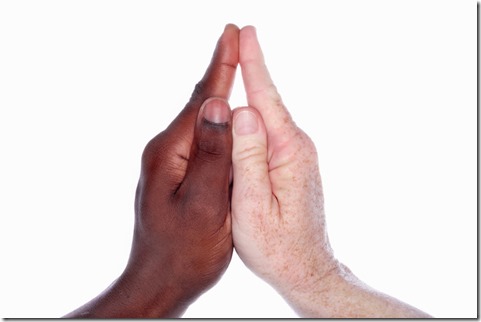
Living Together: Racial Reconciliation is a Christian Imperative
 In my last post I wanted to point out that either elation or despair by Christians over the election of Donald Trump indicated that a person had probably put their hope for the future of our country—and perhaps the world—in someone other than Jesus.
In my last post I wanted to point out that either elation or despair by Christians over the election of Donald Trump indicated that a person had probably put their hope for the future of our country—and perhaps the world—in someone other than Jesus.
That is not to say that the election doesn’t have consequences for us as Christians, or that our response is to retreat back into the private world of personal spiritual growth and churches that are only concerned about other-worldly, “heavenly” things i.e. a non-physical place of reward for the elect.
No, following Christ means engaging the world, not retreating from the world, and that has political ramifications that must transcend party allegiance.
The reality is the same whether you voted enthusiastically for Trump, held your nose and voted for him, voted for Clinton, voted for someone else, or didn’t vote at all: whatever virtues one might find in him, our next President is a man who during the campaign voiced strong views that were considered to be racist and anti-Semitic.
They were considered so not just by his opponents but by racist, anti-Semitic white supremacist groups. He has embraced and been embraced by the Alt-Right, of which many are white supremacists. The KKK cheered his election, not in spite of his statements on race and ethnicity but because of them.
For many Christians this was sufficient to be disqualifying, and for others, particularly evangelical Christians, this was disturbing but not disqualifying. Surely all Christians, however, hope that it was just campaign rhetoric and doesn’t reflect his true beliefs or how he will govern.
Regardless, for all Christians the imperative to stand for justice, equality, and fairness to all regardless of race, ethnicity, or religion must be seen as a large part of what it means to follow Jesus.
Not only in his death for all humanity but in his life Jesus broke down ethnic and gender barriers, placing all people on level ground. At one point he even praised the faith of a Roman centurion.
The New Testament writers understood the implications of his ministry; much of the rest of the New Testament concerns the welcoming of all ethnicities into the faith. It was not just the welcoming of different ethnicities, however, that was envisioned, but the mixing and interaction of them that was important.
The New Testament doesn’t envision that different ethnicities would be segregated into separate churches but that the church would represent to a segregated world a kingdom of God that was fully integrated.
Not that this proved easy. Paul’s letters to the Romans and Corinthians each addressed the difficulty of Jews and Gentiles co-existing in the church, but he implored them to do it because it witnessed to something vital about the movement that Jesus started.
People wanted change in Washington, and that’s understandable and even admirable; but the change that Christians must want and work for must be for greater equality, not less; greater acceptance, not less; more inclusion in the full life of the country, not less; and greater protection of racial, ethnic and religious minorities, not less.
This is beyond the Constitution or loyalty to our country. This is a matter of our loyalty and allegiance to Christ, not just to the person of Christ but to his ministry to and among the weakest, most vulnerable members of society.
Photo by © Can Stock Photo / soupstock
 I am a lifelong student of the Bible, and have been a pastor for over twenty-five years. My desire through this blog is to help people see things in the intersection of Scripture and real life that they might have missed. The careless handling of the Bible is causing a lot of problems in our churches and our culture--and is literally turning people away from the church, and, sometimes, God. I hope to treat Scripture with the respect it deserves, and, even if you don't agree with what I say, give you some insight.
Feel free to leave a comment. I promise to respond to you. All I ask is that you be respectful in your comments.
I am a lifelong student of the Bible, and have been a pastor for over twenty-five years. My desire through this blog is to help people see things in the intersection of Scripture and real life that they might have missed. The careless handling of the Bible is causing a lot of problems in our churches and our culture--and is literally turning people away from the church, and, sometimes, God. I hope to treat Scripture with the respect it deserves, and, even if you don't agree with what I say, give you some insight.
Feel free to leave a comment. I promise to respond to you. All I ask is that you be respectful in your comments. 
Connect with Me